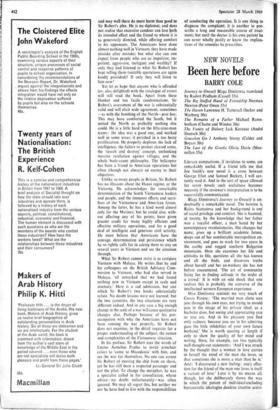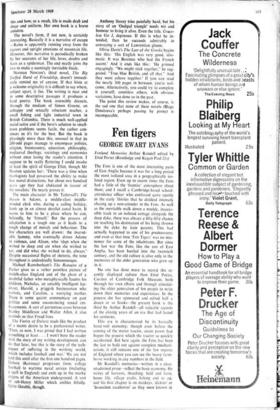NEW NOVELS
Been here before
BARRY COLE
The Big Stuffed Hand of Friendship Norman Newton (Peter Owen 35s) The Haven Lawrence H. Tattersall (Seeker and Warburg 30s) The Remains of a Father Michael Rams- botham (Chatto and Windus 30s) The Vanity of Duluoz Jack Kerouac (Andre Deutsch 30s) Graceless Go 1 Anthony Storey (Calder and Boyars 30s) The Last of the Greeks Olivia Davis (Mac- millan 35s) Literary comparisons, if invidious to some, are remarkably useful. If a friend tells me that Joe Smith's new novel is a cross between George Eliot and Samuel Beckett, I will cer- tainly read it. And in the sort of space allowed for seven novels such usefulness becomes necessity if the reviewer's interpretation is to be successfully communicated.
Blaga Dimitrova's Journey to Oneself is un- doubtedly a remarkable novel. The heroine is Raina Stamatova and her background is one of social privilege and comfort. She is haunted, at twenty, by the knowledge that her father was a royalist officer, a man hated by her contemporary revolutionaries. She changes her name, gives up a brilliant academic future, drops out of her comfortable metropolitan en- vironment, and goes to work for two years in the earthy and rugged southern Bulgarian mountains. Here- she examines her life and attitudes to life, questions all she has known and all she finds, and discovers truths about herself and her co-workers she has not before encountered. 'The art of community living lies in -finding solitude in the midst of a crowd.' It is with an odd shock that one realises this is probably the converse of the intellectual western European experience.
Miss Dim:itrova reminds me very much of Cesare Pavese: 'The married man alone sees you through his own eyes, not trying to mould you in the image of his private ideal, as a bachelor does, but seeing and appreciating you as you are. And in his pleasure you find only sadness; because you see in his admiring gaze the little infidelities of your own future husband.' She is worth quoting at length if only to show the quality of her mind and writing. Here, for example, are two typically well-thought-out statements: 'And I was struck by the thought that a woman in love carries in herself the mind of the man she loves, so that sometimes she is more a man than he is.' And : 'I discovered a new feeling: one's affec- tion for the friend of the man one loves is itself a variant of love.' Love is by no means all, though, for she deliberately shows the way in which the poison of individual-excluding bureaucratic ideologies deadens creative activi- ties and how, as a result, life is made drab: and drear and uniform. Her own book is a brave antidote.
The novel's form, if not new, is certainly interesting. Basically it is a narrative of escape —Raina is apparently running away from the rigours and upright emotions of mountain life. However, this narrative is periodically broken by her accounts of her life, loves, doubts and fears as a spiderman. The end neatly joins the two to make a seemingly inevitable finale.
Norman Newton's third novel, The Big Stuffed Hand of Friendship, doesn't immedi- ately remind me of anyone. If that hints at a welcome originality it is difficult to say where, subject apart, it lies. The writing is neat and in some descriptive passages it produces a hard poetry. The book ostensibly dissects, through the medium of Simon Greene, an unhappy and sexually reluctant teacher, a small fishing and light industrial town in British Columbia. There is much well-applied social satire and if the hero's solution to small- town problems seems facile, the author con- vinces us it's for the best. But the book is pleasingly more than this, unusual in that its 200-odd pages manage to encompass politics, religion, freemasonry, education, philosophy, mediaeval theology, sociology and economics without once losing the reader's attention. I suppose to be really flattering I could invoke at least the spirit of George Eliot, though Mr Newton updates her: 'There was a time when theologians had possessed the ability to make fine moral distinctions, but about two hundred' years ago they had abdicated in favour of the novelists.' He nearly proves it.
The main character in ,Mr Tattersall's The Haven is Adams, a middle-class middle- minded clerk who, during a sailing holiday, lands up in an almost derelict canal basin. H seems to him to be a place where he can, belatedly, be 'himself.' But the process of adaptation is a tough one as it leads to a rough change of morals and behaviour. The few characters are well drawn: the inscrut- able Sammy, who eventually drives Adams to violence, and Alison, who 'slept when she wished to sleep and ate when she wished to eat, and did what she wished to do, always.' Despite occasional flights of rhetoric, the tone throughout is undoubtedly Simenonesque.
Michael Ramsbotham's The Remains of a Father gives us a rather pointless picture of middle-class England and of the ghost of a doubtful father who metaphysically haunts his children, Nicholas, an amiably intelligent lay- about, Harold, a priggish businessman who molests, and Caroline, a worrying mother. There is some quaint commentary on past politics and some unconvincing sexual em- bracements. A sort of portentous cross between Stanley Middleton and Walter Allen, it also reminds us that Freud lives.
The Vanity of Duluoz reads like the product of a manic desire to be a professional writer. 'Then, as now, I was proud that I had written something at least . . . I won't bore the reader with the story of my writing development, can do that later, but this is the story of the tech- niques of suffering in the working world, which includes football and war.' We are not told this until after the first one hundred pages. Duluoz (Kerouac) progresses from college football to wartime naval service (including a spell in England) and ends up in the murky origins of the American underground. A sort of sub-Henry Miller which ambles fitfully. Quite likeable, though. Anthony Storey tries painfully hard, but his story of an 'Oedipal triangle' needs wit and humour to bring it alive. Even the title, Grace- less Go 1, depresses. If this is what he in- tended, then he succeeds admirably in conveying a sort of Lawrentian gloom.
Olivia Davis's The Last of the Greeks begins like this: 'His English was very good, idio- matic. It was Berenice who had the French accent.' And it ends like this: 'He grinned engagingly. "We might stick together," he sug- gested. "True blue British, and all that." And they went ashore together.' If you can read the nearly 300 pages in between, you're wel- come. Alternatively, you could try to complete it yourself; countless others, with obvious variations, have done so in the past.
The point this review makes, of course, is the sad one that none of these novels (Blaga Dimitrova's perhaps passing by proxy) is incomparable.



































 Previous page
Previous page